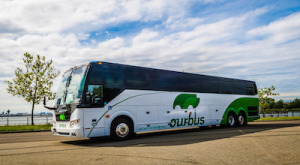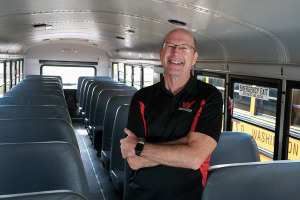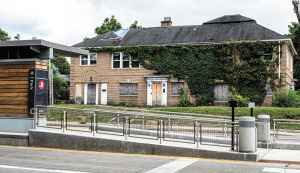
Parent sues Pike Township school district after bus driver sentenced for choking student
The mother of the student is suing the district and transportation department for negligence for hiring an unfit employee.

The mother of the student is suing the district and transportation department for negligence for hiring an unfit employee.

After initially voicing their opposition to IndyGo’s plans to construct a dedicated bus line along Washington Street for the Blue Line, three Irvington business owners are changing their tune.

Should the bill pass the Senate chamber, it will move to the House, where Speaker Todd Huston, R-Fishers, has indicated it has support.

Progress on the transit agency’s third rapid-transit bus line stalled a year ago when projected costs ballooned by $300 million over the expected $220 million price tag. Since then, IndyGo leaders have adjusted plans and cut costs down to a projected range of $370 to $390 million.

The service was launched after Indiana withdrew funding for Amtrak’s Hoosier State train service from Indianapolis and Chicago in July 2019.
Six school districts in Indiana are among those that have been chose to to receive grants.
IndyGo is also considering whether to move the western-most segment of the Blue Line off Washington Street and onto Interstate 70, a move that would save money and appease lawmakers who have been critical of adding dedicated bus lanes to Washington Street.

Tony Dzwonar had just wrapped up three consecutive terms on the Washington Township school board—serving from 2008 to late 2020—and was looking for a way to spend his extra free time. Then he remembered that the district—like most school corporations—needed bus drivers.

Construction on the $188 million Purple Line is expected to begin in early 2022. The route will extend from downtown Indianapolis to Lawrence.

IndyGo announced in September that it would cut bus frequencies on 15 routes, effective Oct. 10, in a decision driven by its workforce and ridership numbers.
Superintendent Flora Reichanadter tweeted that a confluence of driver illness, planned medical leave, and the general shortage of bus drivers led to many routes without drivers.

Earlier this month, the Democrat-controlled City-County Council voted 20-5 for new development standards that add residential and mixed-use districts to push bus usage, walkability and density county-wide.
The startup has already signed deals with schools and metro bus services in Baltimore, Los Angeles, Philadelphia, Fort Wayne and Jacksonville, Florida. The firm also rolled out a system two months ago for rail cars and has it in place in Philadelphia.

With little opposition, the Indianapolis Public Schools board on a 6-1 vote approved cutting school bus service for about 600 high schoolers.
While significant, the cut to transportation is less than half what the district was sketching out in January, as it sought to lower operating costs amid steadily shrinking enrollment and a severe budget crunch.

If the Indianapolis Public Schools board approves the most drastic cuts, about 5,600 high school students and 4,000 elementary school students could lose district-provided transportation.

Indianapolis-based Synovia Solutions’ latest platform—Bus Guardian—helps with contact tracing and hygiene verification for school buses.

IndyGo has been operating on a reduced schedule since March 29 because of COVID-19-related staff shortages and ridership declines.
IndyGo temporarily suspended fare collections March 29 to reduce interaction aboard buses.

IndyGo is among transit operators nationwide that will share $25 billion in federal aid as part of the Coronavirus Aid, Relief and Economic Security Act.